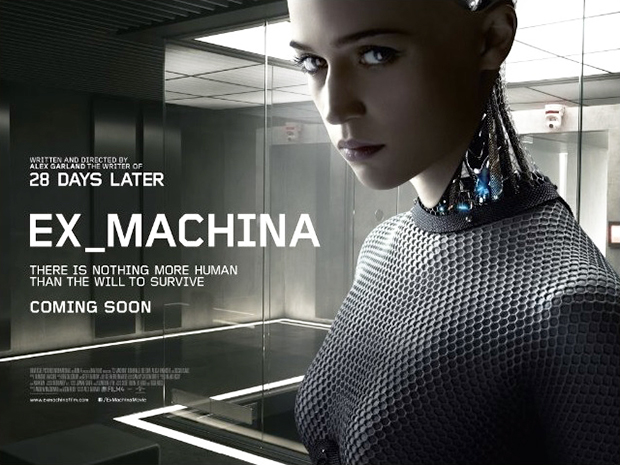Ex Machina, film review: Turing test meets sci-fi horror


OK. We know this much: Nathan is the insanely wealthy head of Bluebook, the world's largest search engine company. His house has the empty smoothness of an apocalyptic mansion in a computer game and the electronic capabilities of a military installation: a computer at the door uses facial recognition to issue Caleb a keycard that will grant him access to the areas he's authorized to visit. ('Why not just use facial recognition throughout?' you ask. Can we say 'idiot plot' and move on?)
Before Caleb can go any further, like Mae in The Circle, he is required to sign a non-disclosure agreement. He hesitates over a clause requiring him to submit to 'data audits' to ensure he has not disclosed anything he's seen. What he doesn't ask before signing (and he has to sign or there's no movie) is what form such data audits might take. Even five minutes into the movie, you're suspicious that this Nathan guy might be into open-brain surgery where protecting his data is concerned. I mean, come on: Caleb is the modern version of the naïve Victorian maiden sent to a remote castle inhabited only by a mad scientist and his butler, Igor.
Turing tester
Only now does Caleb learn the purpose of his week-long visit: he is there to conduct a version of the Turing test. Asked for our benefit if he knows what that is, he bungles the explanation somewhat, although he does clarify later. Classically, a computer passes the Turing test if human judges, interacting blind with it remotely, believe it's human.
Here, instead, Caleb pursues a series of face-to-face sessions with Ava (Alicia Vikander), who is ostentatiously mechanical: her legs, arms, midriff, and neck are all transparent, showing her inner glowing lights and gleaming metallic components; an opaque, grey, fishnet-patterned substance covers the rest of her like a tightly-fitting crop top and hot pants. The idea, Nathan explains, is that Caleb should decide whether she has real consciousness while being constantly jolted into suspicion by her artificial appearance. Given that he is the boss and clearly wants Caleb to be impressed, this 'test' seems gamed from the start. Ava's perfectly shaped body also seems designed to throw Caleb off his game.
It's a credit to the film that although we always know nothing can be as it seems, it's not immediately clear which characters to suspect. It doesn't take long to start wondering if the mute, unsmiling Kyoko (Sonoya Mizuno) is an android: Nathan's explanation is that in order to protect confidentiality she speaks no English -- but she can clearly hear, and humans pick up things pretty quickly. But Nathan: what is he?
At Roger Ebert's site, Matt Zoller Seitz compares Ex Machina to The Shining. However, it reminded me much more of two other films: 1975's The Stepford Wives and the 1932 movie Freaks. In the former, based on a book by Ira Levin, the men in a small suburban Connecticut town are so offended by women's liberation that they are systematically replacing each man's career-minded wife with an utterly compliant, perfectly formed android. In the latter, a group of variously deformed people forced to perform as carnival sideshows eventually turn on their non-'freak' tormentors. In other words, it turns into your basic horror film -- which I think is a pity, because the first half-hour offered much more interesting prospects.